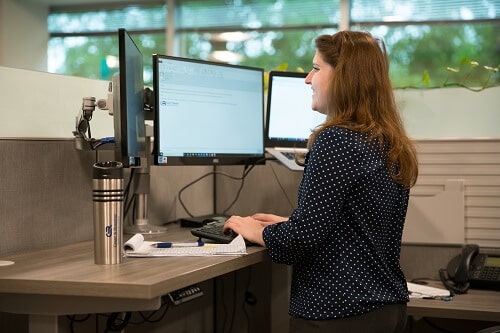
According to Dr. James Levine, an endocrinologist at the Mayo Clinic, sitting is the new smoking. In his study that spanned 15 years, it was determined that spending more than six hours a day on your behind contributes to unhealthy blood pressure, obesity, depression and some types of cancer. And that’s just for starters. Here are a few simple things you can do every day to combat these potentially life-threatening conditions.
- Set a timer. When you’re engrossed in your work, time can slip away. You glance at your watch and you’ve been sitting for two hours. This can take a toll on your health. Set a timer for every 30 minutes. Get up, stretch, go the restroom, drink water, take a lap around the office while your files are downloading or step outside and get some fresh air. The more you move around during the day, the better your overall health – both physical and emotional – will be.
- Wash your hands. Those pesky germs are everywhere: door knobs, keyboards, conference rooms, you name it. They’re invisible and potentially harmful. And, as much as you may (or may not) like them, your coworkers are also a source of infection, with their sneezing and coughing. Keep some hand sanitizer at your desk. Even better, get up and wash your hands in the restroom, the latter of which is doubly healthy because you’ll be moving your body.
- Walk and talk. You’ve seen those movies where the boss says, “Walk with me.” It turns out this dynamic has some merit – and health advantages. Instead of sitting down with someone, ask them to take a walk with you to discuss the subject at hand. If it’s a phone meeting, get up and pace. Moving those legs is a good thing.
- Drink plenty of water. Hydration is key to keeping yourself in tip-top shape. But know this: thirst doesn’t always signal that you need liquids; it can also be a sign of hunger, at which point you might be tempted to grab a sugary snack. Solution? Drink water instead to quell your grumbling stomach. Thirst is also a symptom of lack of sleep, which leads us to the next tip.
- Get a good night’s sleep. When you don’t have enough sleep, everything has the potential to be off-kilter: your mood, attention span and your sense of being satiated. In case you feel hungry, drink water – or even hot tea. When your stomach is full, you minimize the chance of overeating or eating something that’s full of fat or sugar, which can lead to weakening your immune system in its already compromised state (sleep deprivation).
- Invest in a pedometer. Getting steps in is not just for people over 65. Everyone needs them. Pedometers are generally affordable – between $15 and $35. According to an article in Prevention magazine, after one woman increased her daily activity to 9,950 steps a day, she lost five pounds and lowered her cholesterol 24 points. Get steppin’ for feeling better and staying well!
- Check your posture. If refrains of “sit up straight” from parents and teachers are circling through your head, don’t push them away. Turns out that bad posture can lead to all kinds of detrimental effects: sore muscles, spinal curvature, blood vessel and nerve constriction, not to mention depression, low energy and stress. No one needs that. Instead, adjust your backside so that it touches the back of your chair. Look at the ceiling to stretch your neck. Raise your arms and reach for the sky. Relax your shoulders. And lastly, breathe.
- Adjust your monitor. Sitting too close to your monitor can cause eye exhaustion, burning and muscle aches. And when your monitor is too high or low, it can lead to headaches, double vision, difficulty focusing your vision, nausea and dizziness. Here’s the remedy: sit about an arm’s length away and align the top of your screen with your eyes so that you look down a bit at your monitor. This should alleviate any irritations that might arise.
So, the next time you’re sitting at your desk and are in between tasks, give these tips a read. See if one of them applies and give it a try. One small tweak to your daily routine could make all the difference for your health and well-being.
Disclaimer: These articles are intended to provide general resources for the tax and accounting needs of small businesses and individuals. Service2Client LLC is the author, but is not engaged in rendering specific legal, accounting, financial or professional advice. Service2Client LLC makes no representation that the recommendations of Service2Client LLC will achieve any result. The NSAD has not reviewed any of the Service2Client LLC content. Readers are encouraged to contact their CPA regarding the topics in these articles.

At C&R we all have sit-to-stand desks — a healthy benefit at our new office!

